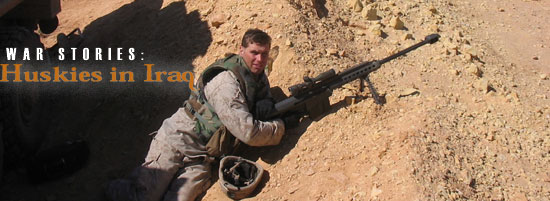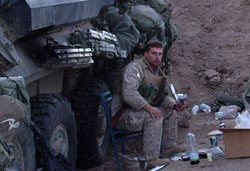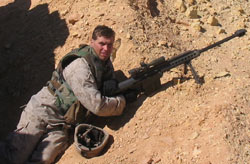

Ted Lester, '02
Corporal, 3rd Light Armored Reconnaissance Battalion, Marines; Time of service: August 2004-April 2005; Stationed: all over; Currently: Marine Corps Air Ground Combat Center, Twentynine Palms, Calif.
 It was seven months of combat. Because we had armored vehicles, we had the ability to move across entire regions, or the whole country. With a few hours notice, we could get anywhere within about a day or so. And that's pretty much how our time was spent-just jumping from hot spot to hot spot.
It was seven months of combat. Because we had armored vehicles, we had the ability to move across entire regions, or the whole country. With a few hours notice, we could get anywhere within about a day or so. And that's pretty much how our time was spent-just jumping from hot spot to hot spot.
We just got hit all the time. We'd go to a house, and we'd check the house, and there'd be nothing we could find-the property would be clean, no weapons. There'd be no apparent involvement with any Mujahideen or anything like that. Then we'd leave, let them go, apologize, give them a case of water, give them a case of food. And then the next day we'd get ambushed from that area. It was hard, because . there are people who truly want the help. But they're few and far between. And the majority of people-they just don't want any involvement. They seem to be so scared of the insurgency. They want to stay at home and not get involved. They don't want to be on their side; they don't want to be on our side.
... We were constantly laughing. That's one thing I do kind of miss. We'd laugh every day, so hard. I've never laughed so hard before in my life. And you have to. Anything from making stupid nicknames for each other, that were totally offensive and so inappropriate and would never fly in the outside world-I'm talking, like, racial jokes . I'm a white guy, and we had a couple of black guys on the platoon, and there was stuff that I could say to them that I would never be able to get away with [back here]. And in return they could do the same to me, and no one cared. Everything from that to making jokes about the dead bodies we'd come across-some guy could be totally obliterated, burned to a crisp, and someone would look down and say, 'At least he's got nice socks.' It got pretty bad sometimes. . You've got to clown around with everyone, and no one's immune.
Fallujah was the toughest by far. You couldn't trust anyone. You constantly had to watch your back. You'd think that if a woman and child were coming up to your checkpoint, it would be no problem. They're not as suspicious as a military-age male. But there are female suicide bombers, kids carrying grenades. Nobody could be trusted. And you really felt . a great sense of frustration. You really felt alone, even though you're with all these other guys. You're disconnected from the outside world, so you're wondering, 'Is this even worth it? Are we even making any progress?' It felt awesome, once it was over with. But at the same time, within 48 hours of returning to our base for the first time in a month, we were told, 'Now you're going to Ramadi. You're going to try to take down Ramadi too.' So there we were, back to how we felt at the beginning of Fallujah. 'Aw man, are we gonna make it through this one?'
 One of the stories that comes to my mind was a time where one of our platoons was down on the river, on the Euphrates, and at this point [Fallujah] was within days of falling. They started having insurgents swim across the river. And we were told at first that we were going to fire warning shots at them, to get them back into the city. But if they do happen to make it across the river, if they're wounded, our priority is to collect and care for the wounded. So this one day we got a report of some people that had dropped weapons and were swimming across the river. And we went down to check it out, and there were a couple of guys . that were starting to low-crawl out of the water, through the mud, and up to the bank. They kept screaming and yelling, 'Mister, mister, help me, we're hurt, we're hurt, we need help.' And we went down there to help them out. And I mean obviously our weapons were still drawn on them, because we weren't sure what to expect. And as we went up to go help them, one of the guys just leapt out of the mud and threw a grenade at us. And so he got killed, needless to say. And none of our guys got hurt. But it turns out that they were part of a 12-man squad that was sent across the river with grenades to try to ambush us.
One of the stories that comes to my mind was a time where one of our platoons was down on the river, on the Euphrates, and at this point [Fallujah] was within days of falling. They started having insurgents swim across the river. And we were told at first that we were going to fire warning shots at them, to get them back into the city. But if they do happen to make it across the river, if they're wounded, our priority is to collect and care for the wounded. So this one day we got a report of some people that had dropped weapons and were swimming across the river. And we went down to check it out, and there were a couple of guys . that were starting to low-crawl out of the water, through the mud, and up to the bank. They kept screaming and yelling, 'Mister, mister, help me, we're hurt, we're hurt, we need help.' And we went down there to help them out. And I mean obviously our weapons were still drawn on them, because we weren't sure what to expect. And as we went up to go help them, one of the guys just leapt out of the mud and threw a grenade at us. And so he got killed, needless to say. And none of our guys got hurt. But it turns out that they were part of a 12-man squad that was sent across the river with grenades to try to ambush us.
For a month or two or three at a time, your house is in a pile of mud. And it's 20 degrees at night, 90 degrees during the day, there's body parts of a suicide bomber lying all around you, it smells like crap, you're not getting anything good to eat, you're getting, like, two hours of sleep. It's really hard to relate to people who haven't done it, because they just can't imagine it. You come back to your friends and family, and life is normal for them. It's as it was before you left. But for you, it's just, like, every little thing . As of right now I don't like being around large crowds of people. And there are certain smells that will trigger memories. And obviously, like a car backfiring or a door shutting in the distance-that echo just sounds like a mortar round impacting. It's not drastic-it's not like I'm going to pull out a gun and start shooting back or anything. It's just enough to make you freeze for a second, and think, 'Am I really home? Am I really out of this?'
Return to War Stories: Huskies in Iraq.
Questions for the Vets. A web exclusive with questions to those serving in Iraq.
To Baghdad and Back: Page 1 | Page 2 | Page 3
Loss and Recovery: UW Expert Aids Army Amputation Units